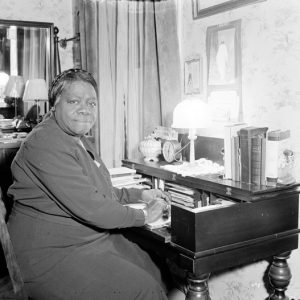calsfoundation@cals.org
NYA Camp Bethune
aka: Camp Bethune
National Youth Administration (NYA) Camp Bethune was part of a New Deal program that provided opportunities for literacy and critical advantages for young Black women from across the state of Arkansas during the Great Depression. Arkansas Agricultural, Mechanical, and Normal (AM&N) College in Pine Bluff (Jefferson County), now the University of Arkansas at Pine Bluff (UAPB), incorporated the camp site. The camp marked the network of regional and national political activism among African Americans who negotiated community and citizenship in the first half of the twentieth century.
The Federal Emergency Relief Appropriation (FERA) Act created the NYA in 1935. The agency funded part-time work for students between the ages of sixteen to twenty-five, as well as worked to promote public and civic health. The flexibility of President Franklin D. Roosevelt’s administration in addressing the economy, coupled with his and First Lady Eleanor Roosevelt’s civil gesture of engaging Black Americans, facilitated the appointment of Mary McLeod Bethune as NYA Director of the Division of Negro Affairs. Bethune (1875–1955), the most visible and influential member of Roosevelt’s “Black Cabinet,” occupied the first federal position created for a Black woman in June 1936, and she became a nationally prominent political and educational figure in the Second New Deal. Bethune’s strategic positions in the Roosevelt administration, Southern higher education, and Black women’s clubs placed her within a professional network in which she was already familiar with John Brown Watson, president of AM&N College, and his wife, Hattie Rutherford Watson.
In 1936, the NYA Division of Negro Affairs created “five special camps for Negro girls” located in New Jersey, the Carolinas, Florida, and Arkansas. The Bethune NYA Educational Camp for unemployed, single Black women ages eighteen to twenty-five enrolled sixty-two young women in the first session and fifty-eight in the second session. To make a camp-like environment, the agency built canvas tents with wooden sides and floors; the tents were fueled with gas heat and electricity. The campers ate their meals each day in the AM&N College dining hall.
Bethune appointed Hattie Rutherford Watson the director of the camp, and Watson supervised a faculty of eight and seven, respectively, during the two camp sessions. In keeping with the New Deal’s commitment to public health, the staff also included a camp physician and nurse. The academic schedule consisted of English, social science, home economics, and physical education (softball, baseball, tennis, and croquet) courses five days each week for three hours. The paid vocational classes of needlecrafts, handicraft arts, and horticulture met six days each week for three hours. Additional activities included a student government association; a camp newspaper, Bethune Spotlight; daily camp assemblies; a Monday night lecture series; a picture gallery of accomplished African-American women; bus trips to Pine Bluff sites of interest; AM&N College athletic games; a spring Easter egg hunt; hikes and wiener roasts; faculty-chaperoned dances; and hosting state and federal visitors, including Bethune, as well as parents.
Political pressure that supported a racial and gender status quo forced the closure of NYA Camp Bethune after its two successful sessions in 1937, and the agency closed all its educational camps for women after two years of operation. The closure of NYA Camp Bethune corresponded to the regional political ethos that also excluded agricultural labor and domestic service, the two most important categories of employment for African Americans, from the benefits of Social Security in 1935.
For additional information:
Bracey, John H., Jr., Sharon Harley, and August Meier, eds. Bethune Foundation Collection, Part 1. Bethesda, MD: University Publications of America, 1995. Microfilm copy, reel 12.
Gordon, Fon. “‘A Generous and Exemplary Womanhood’: Hattie Rutherford Watson and NYA Camp Bethune in Pine Bluff, Arkansas.” In The Southern Elite and Social Change: Essays in Honor of Willard B. Gatewood, Jr., edited by Randy Finley and Thomas A. DeBlack. Fayetteville: University of Arkansas Press, 2002.
John Brown Watson Papers. John Hay Library, Brown University, Providence, Rhode Island.
Smith, Elaine M. “Mary McLeod Bethune.” In Black Women in America: An Historical Encyclopedia, Vol. 1, edited by Darlene Clark Hine. Brooklyn: Carlson Publishing Inc., 1993.
Weiss, Nancy J. Farewell to the Party of Lincoln: Black Politics in the Age of FDR. Princeton, NJ: Princeton University Press, 1983.
Fon L. Gordon
University of Central Florida
 Early Twentieth Century, 1901 through 1940
Early Twentieth Century, 1901 through 1940 Mary McLeod Bethune
Mary McLeod Bethune 




Comments
No comments on this entry yet.